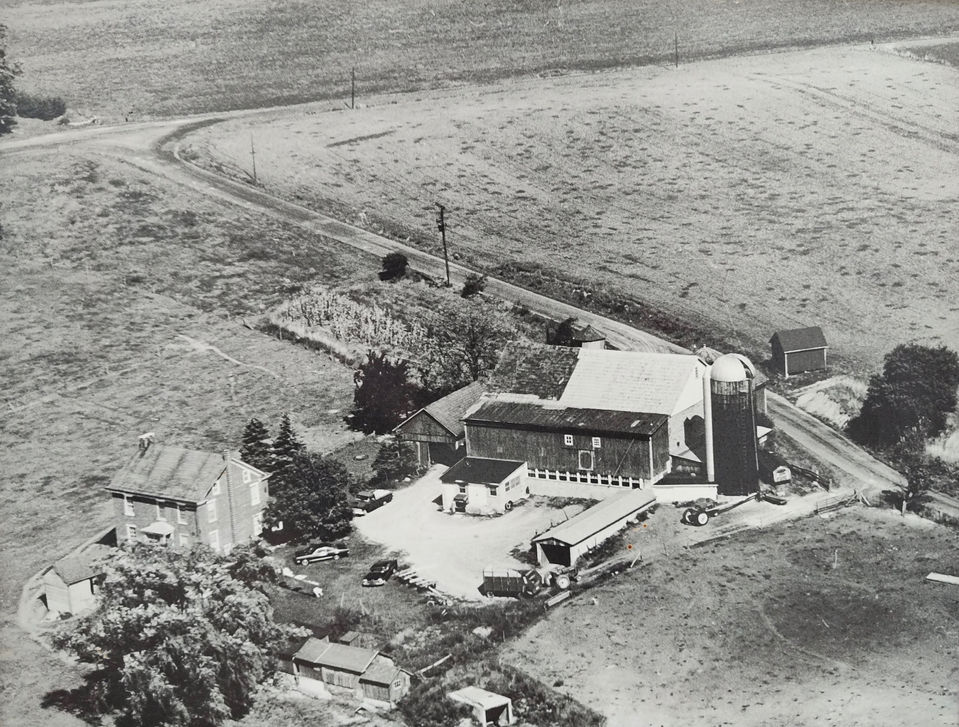
About
BAD FARM and the RICE FAMILY




BAD FARM
Established 1986
BAD Farm was originally established as B and D Farm when the 13 acre farm was purchased back in 1986 by Beth and Dave. They raised three sons, Jake, Jason, and Jordan on the farm.
Jake works for United Rentals as a diesel mechanic and currently lives in Wisconsin with his wife Cassie who is a veterinarian.
Jordan is the owner of local business, Jordan's Small Engines. His home and business is located in Wanamakers, where he lives with his wife Amy and their three children.
Jason, nicknamed Bubba, chose to continue to farm having a passion for the dairy cows. He shares in the mechanical talents of his brothers as he attended BCTC for Heavy Equipment Technology. After graduating high school in 2008, he went on to attend SUNY Morrisville College in New York and majored in Dairy Science. While there, he had the idea to start selling raw milk as a way to make the farm more profitable and allow the farm to stay in business. So Beth and Dave received a PA Raw Milk Permit back in 2009. Since then BAD FARM has expanded to include a variety of other dairy products in addition to the raw milk that started it all.
Today we farm around 600 acres of cropland, milk about 65 Holstein cows and raise our own replacement heifers. Additionally, we raise 200 Rhode Island Red chickens for egg production and Holstein steers for beef.
In December of 2019, Jason and Kacey became the 2nd generation owners of BAD Farm. They met in high school where they were both active in the Kutztown FFA Chapter at the Kutztown Area High School. They married in 2012, actually right here on the farm with the cows as witness! They have two boys, Emmit and Ellis.
Today the BAD Farm is thrilled to have 3 generations working alongside each other to continue our family farm tradition. Beth and Dave, now Grammy and Pappy Rice, are still very active on the farm and enjoy teaching all their grandchildren about life on the farm. Emmit and Ellis join their cousins Logan, Caleb and Lydia as our junior farmers and hopefully future 3rd generation of BAD Farm.
Our Cows >
Our Crops >
Our Chickens >
Our Beef >
We raise our Holstein steers for beef production. While not Angus, they still produce quality beef and for an affordable price. Our steers are fed a mixture of dried hay, corn silage, haylage, soybeans, and added vitamins and minerals. They also have regular access to pasture after they reach about 6 months of age. Once they reach market weight, we use Springfield Meat Company in Coopersburg, PA to process our beef products. See our Products page for more details.
We currently farm around 600 acres of crop land in the Kempton area. While we only own 13 acres with our farm, we rent the rest. We grow alfalfa, rye, oats, and corn. We also have some mixed grass hay fields. We use no till farming practices but are not organic. We use as much of our own natural fertilizer as possible, but will also add fertilizer when necessary to ensure we have adequate crop growth to provide quality feed. We have a nutrient management plan and test our soils and surrounding water on a regular basis to ensure we are not negatively impacting our local environment.
Our flock of 200 Rhode Island Red chickens are raised cage free. They have free choice feed and water access at all times. We feed them a mixture of corn and soybeans with added vitamins and minerals to keep them healthy. We collect their brown colored eggs each day and wash and package them by the dozen to be sold in our farm store. Our chickens have been known to lay large to jumbo sized eggs and are sold fresh each day of the week.
Our 65 Holstein cows are milked twice a day. In between milking, they can freely roam about our sand bedded free stalls. They eat a mixture of haylage, corn silage, soybeans, and additional vitamins and minerals to keep them healthy. We use fans and sprinklers in the summer to keep them cool and curtains in the winter to help keep them warm. When our milk cows go dry before having a calf, they move to the bedded pack barn with our breeding age heifers and have access to pasture. Our calves are housed in kennels until they are weaned off of milk. Our young animals are then moved to a nearby farm to grow for about the next 12 months before coming back to the bedded pack barn. We strive to provide our animals with quality care by feeding them quality ingredients, providing a comfortable environment, and treating them with respect.


